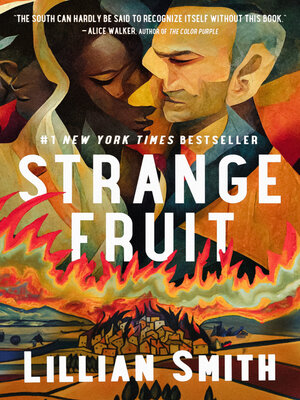
Sign up to save your library
With an OverDrive account, you can save your favorite libraries for at-a-glance information about availability. Find out more about OverDrive accounts.
Find this title in Libby, the library reading app by OverDrive.



Search for a digital library with this title
Title found at these libraries:
| Library Name | Distance |
|---|---|
| Loading... |
The eighty-year anniversary edition of the once-banned, #1 New York Times–bestselling novel of interracial romance and discrimination in Georgia.
Alice Walker said it best: “The South can hardly be said to recognize itself without this book.” Igniting controversy upon its publication in 1944, Strange Fruit was banned in Boston and Detroit and the US Postal Service refused to send it through the mail until Eleanor Roosevelt intervened—all because of its portrayal of a town divided along racial lines and the forbidden love that dared to cross them . . .
Despite having left Maxwell, Georgia, to attend college, Nonnie Anderson returned to her hometown to work for a prominent white family—and to rejoin the man she had always loved, Tracy Deen.
Tracy, the directionless son of the town’s doctor, has come back from war and is being pressured to finally get his life in order. Across the street, his high school sweetheart desperately waits for a marriage proposal. On the other side of town, Nonnie offers him a safe place to land, asking nothing in return. But now, she’s pregnant.
As a Christian revival inspires the locals to cease their sinful ways, a heady and dangerous mix of passion, religion, and racism takes hold. And when a white man is killed in a Black part of town, the event exposes the evil simmering just below the town’s placid surface—an inferno waiting to erupt . . .
“A very moving book and an extraordinary one.” —Eleanor Roosevelt
“Strange Fruit is so wide in its human understanding . . . [its] tragedy becomes the tragedy of anyone who lives in a world in which minorities suffer.” —The Nation
“An absorbing novel, of high literary merit, terrific and tender.” —The Boston Globe
Alice Walker said it best: “The South can hardly be said to recognize itself without this book.” Igniting controversy upon its publication in 1944, Strange Fruit was banned in Boston and Detroit and the US Postal Service refused to send it through the mail until Eleanor Roosevelt intervened—all because of its portrayal of a town divided along racial lines and the forbidden love that dared to cross them . . .
Despite having left Maxwell, Georgia, to attend college, Nonnie Anderson returned to her hometown to work for a prominent white family—and to rejoin the man she had always loved, Tracy Deen.
Tracy, the directionless son of the town’s doctor, has come back from war and is being pressured to finally get his life in order. Across the street, his high school sweetheart desperately waits for a marriage proposal. On the other side of town, Nonnie offers him a safe place to land, asking nothing in return. But now, she’s pregnant.
As a Christian revival inspires the locals to cease their sinful ways, a heady and dangerous mix of passion, religion, and racism takes hold. And when a white man is killed in a Black part of town, the event exposes the evil simmering just below the town’s placid surface—an inferno waiting to erupt . . .
“A very moving book and an extraordinary one.” —Eleanor Roosevelt
“Strange Fruit is so wide in its human understanding . . . [its] tragedy becomes the tragedy of anyone who lives in a world in which minorities suffer.” —The Nation
“An absorbing novel, of high literary merit, terrific and tender.” —The Boston Globe







